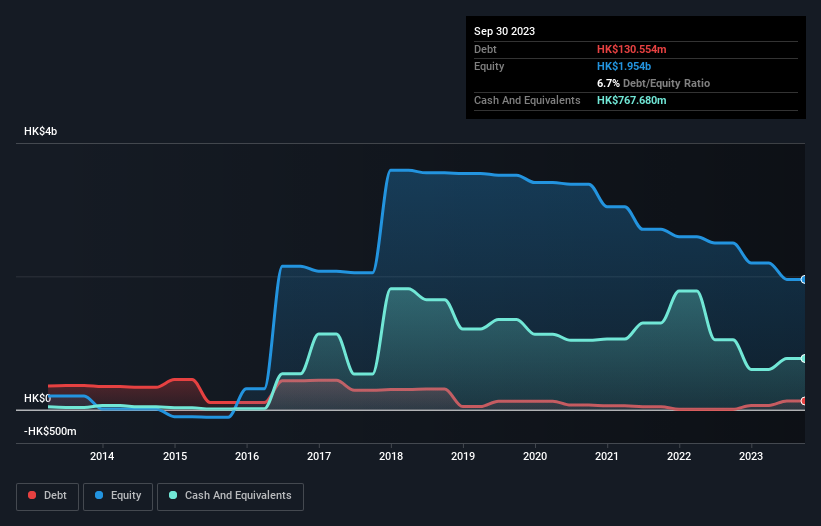David Iben put it well when he said, 'Volatility is not a risk we care about. What we care about is avoiding the permanent loss of capital.' It's only natural to consider a company's balance sheet when you examine how risky it is, since debt is often involved when a business collapses. We note that Productive Technologies Company Limited (HKG:650) does have debt on its balance sheet. But the real question is whether this debt is making the company risky.
When Is Debt A Problem?
Generally speaking, debt only becomes a real problem when a company can't easily pay it off, either by raising capital or with its own cash flow. In the worst case scenario, a company can go bankrupt if it cannot pay its creditors. While that is not too common, we often do see indebted companies permanently diluting shareholders because lenders force them to raise capital at a distressed price. Of course, the upside of debt is that it often represents cheap capital, especially when it replaces dilution in a company with the ability to reinvest at high rates of return. The first step when considering a company's debt levels is to consider its cash and debt together.
See our latest analysis for Productive Technologies
What Is Productive Technologies's Debt?
The image below, which you can click on for greater detail, shows that at September 2023 Productive Technologies had debt of HK$130.6m, up from HK$6.63m in one year. However, it does have HK$767.7m in cash offsetting this, leading to net cash of HK$637.1m.

A Look At Productive Technologies' Liabilities
Zooming in on the latest balance sheet data, we can see that Productive Technologies had liabilities of HK$692.9m due within 12 months and liabilities of HK$98.3m due beyond that. On the other hand, it had cash of HK$767.7m and HK$117.2m worth of receivables due within a year. So it actually has HK$93.7m more liquid assets than total liabilities.
This surplus suggests that Productive Technologies has a conservative balance sheet, and could probably eliminate its debt without much difficulty. Simply put, the fact that Productive Technologies has more cash than debt is arguably a good indication that it can manage its debt safely. The balance sheet is clearly the area to focus on when you are analysing debt. But you can't view debt in total isolation; since Productive Technologies will need earnings to service that debt. So when considering debt, it's definitely worth looking at the earnings trend. Click here for an interactive snapshot.
Over 12 months, Productive Technologies made a loss at the EBIT level, and saw its revenue drop to HK$471m, which is a fall of 6.9%. That's not what we would hope to see.
So How Risky Is Productive Technologies?
By their very nature companies that are losing money are more risky than those with a long history of profitability. And in the last year Productive Technologies had an earnings before interest and tax (EBIT) loss, truth be told. Indeed, in that time it burnt through HK$242m of cash and made a loss of HK$321m. But the saving grace is the HK$637.1m on the balance sheet. That kitty means the company can keep spending for growth for at least two years, at current rates. Overall, its balance sheet doesn't seem overly risky, at the moment, but we're always cautious until we see the positive free cash flow. When analysing debt levels, the balance sheet is the obvious place to start. But ultimately, every company can contain risks that exist outside of the balance sheet. For example, we've discovered 2 warning signs for Productive Technologies (1 is a bit unpleasant!) that you should be aware of before investing here.
If you're interested in investing in businesses that can grow profits without the burden of debt, then check out this free list of growing businesses that have net cash on the balance sheet.
New: Manage All Your Stock Portfolios in One Place
We've created the ultimate portfolio companion for stock investors, and it's free.
• Connect an unlimited number of Portfolios and see your total in one currency
• Be alerted to new Warning Signs or Risks via email or mobile
• Track the Fair Value of your stocks
Have feedback on this article? Concerned about the content? Get in touch with us directly. Alternatively, email editorial-team (at) simplywallst.com.
This article by Simply Wall St is general in nature. We provide commentary based on historical data and analyst forecasts only using an unbiased methodology and our articles are not intended to be financial advice. It does not constitute a recommendation to buy or sell any stock, and does not take account of your objectives, or your financial situation. We aim to bring you long-term focused analysis driven by fundamental data. Note that our analysis may not factor in the latest price-sensitive company announcements or qualitative material. Simply Wall St has no position in any stocks mentioned.
About SEHK:650
Productive Technologies
An investment holding company, engages in the manufacture of equipment applied in semiconductor and solar power businesses in the People’s Republic of China.
Excellent balance sheet with weak fundamentals.
Market Insights
Community Narratives


Recently Updated Narratives


MINISO's fair value is projected at 26.69 with an anticipated PE ratio shift of 20x


The Quiet Giant That Became AI’s Power Grid


Nova Ljubljanska Banka d.d will expect a 11.2% revenue boost driving future growth
Popular Narratives


The company that turned a verb into a global necessity and basically runs the modern internet, digital ads, smartphones, maps, and AI.


MicroVision will explode future revenue by 380.37% with a vision towards success



